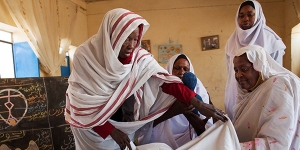How Girls Lead to Advance Youth, Peace, Equality
Tunisian and American activists to end violence against women will join 20 youth leaders from the Middle East and North Africa in a webcast discussion from the U.S. Institute of Peace on Oct. 11 focusing on the role girls play in building peace. The event will take place on the International Day of the Girl Child and is part of USIP’s 60 days of activities connecting issues of youth, peace and gender equality.
The predominant narrative about youth asserts that young men are perpetrators of violence and young women are victims. In reality, both girls and boys, women and men are powerful agents of change and can work together to foster inclusive societies that manage conflict nonviolently.







